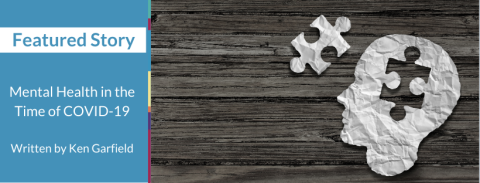Mental Health in the Time of COVID-19
Written by Ken Garfield
Anxiety. Depression. Fear. Loneliness.
Such are the challenges of COVID-19, mental health advocate Kathy Rogers doesn’t hesitate when asked which of these emotions are casting a shadow over many lives. “All of the above.”
The reality is stark: The U.S. Census reports that more than one-third of Americans have shown clinical signs of anxiety, depression or both since the pandemic started. The Centers for Disease Control and Prevention reports that nearly three times as many Americans considered suicide in June compared to the same period two years ago.
Understanding that the pandemic is a crisis of both body and mind, many SHARE Charlotte nonprofit partners and others have mobilized to ease minds in our community. Much of the outreach, including one-on-one counseling, is virtual. But whether online or on the phone, there is comfort in knowing we are not alone.
“We’re all affected in some way,” says Rogers, executive director of Mental Health America of Central Carolinas. “We need to take care of our mental well-being.”
With all mental health emergencies, the first call should be to 911.
A SHARE Charlotte partner, Mental Health America of Central Carolinas has responded to the pandemic by offering suicide prevention training workshops to the public online.
MHA has also conducted training in this vital area with CMS staff and several businesses, stressing QPR: Question. Persuade. Refer. Virtual programs dubbed “Mental Health Matters”, also for the public, have explored yoga therapy and how parents of school-aged children can best manage stress.
The MHA website includes an online directory of mental care health providers. Care packages have been sent to clients with such calming items as mindfulness tips. And because who knows how long staffers will be working from home, MHA is converting to a cloud-based telephone system so calls can be answered as quickly as possible. Rogers hopes COVID-19 inspires us to make mental health services available to all: “The pandemic has shown us the disparity that exists for people of color and low income.”
Terry Albanese participates in one of MHA’s signature programs. Compeer – a blend of companion and peer – matches a volunteer with a client dealing with mental health challenges. Terry’s companion is a single, older woman with no children. Early during COVID-19, she fell and broke her hip. Normally, Terry would be at her side. Now she reaches out through calls, texts and emails, all saying “I am with you.” She even snapped a picture of a butterfly and texted it to her companion. In person or virtually, Terry’s motivation is the same: “I do not like anyone feeling lonely.”
Combined, the six mental health therapists at Teen Health Connection are seeing up to 150 clients a week. That’s well above the pre-pandemic volume. Betsy Thompson, who coordinates mental services for the SHARE Charlotte partner, says anxiety, depression, isolation and loneliness brought on by the pandemic have exacerbated existing clients’ issues and brought new clients to their door. Plus, she says, being confined to home, with family, isn’t always a safe place. At in-person and online sessions, therapists offer similar advice: Don’t be afraid to seek help. Keep as normal a schedule as possible, for example, the same number of hours of sleep each night. Exercise. Get outside and soak up the sunshine. Limit screen time. Stay connected with people, even if it’s by FaceTime. “We’re trying to have our patients find joy in small places, and focus on one day at a time, reminding all of us that this won’t last forever,” Thompson says. Teen Health Connection, part of Atrium Health, offers medical and mental health services to ages 11 to 25.
HopeWay, a nonprofit mental health treatment facility, launched #talkabout it in September – free materials online and in print meant to inspire conversation about mental health and wellness. Each set of materials is geared to different groups, including women, men and people of color. HopeWay, a SHARE Charlotte partner, encourages book clubs, supper clubs, departments within corporations and other gatherings to use #talkaboutit as a springboard to honest discussion.
Many houses of worship have expanded its mental health ministries. Carmel Baptist Church in Matthews, for example, held weekly Care Conversations on Zoom this past spring and summer, offering a chance to share COVID-19 challenges. A new Family Grace care group is devoted to families with a loved one dealing with mental illness. Care Clips on Vimeo, some as short as a minute, offer practical pandemic advice: Keep your body moving – do chair pushups while sitting at your desk, for example. Accept the fact it’s OK to have mixed emotions such as faith and fear. Within four days of the pandemic shutting most everything down, the counseling team started doing telehealth visits using new software. “Baptized by fire,” they called it.
Memory & Movement Charlotte, a nonprofit medical practice devoted to treating Alzheimer’s, Parkinson’s and other forms of dementia, has hosted Zoom Happy Hours during the pandemic. Patients and caregivers have linked in to tell a sheltering-in-place story or share a musical talent. Because laughter can be the best medicine, Parkinson’s patient Marty Schwartz went one “step” beyond. Unable to walk outside, he produced a video of him walking around the house. And to show that COVID-19 can’t keep a hopeful man down, he set it to music – the Bee Gees’ “Staying Alive” from “Saturday Night Fever.” Schwartz even toted a paint can like John Travolta did in the movie.




